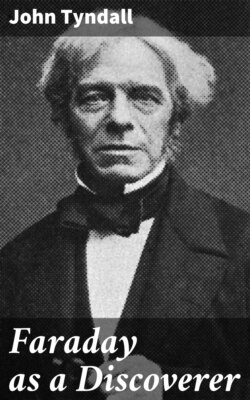Читать книгу Faraday as a Discoverer - John Tyndall - Страница 11
На сайте Литреса книга снята с продажи.
Footnotes to Chapter 2
ОглавлениеTable of Contents
(1) The reader's attention is directed to the concluding
paragraph of the 'Preface to the Second Edition written in
December, 1869. Also to the Life of Faraday by Dr. Bence
Jones, vol. i. p. 338 et seq.
(2) Paris: Life of Davy, p. 391.
(3) Viz., November 19, December 3 and 10.
(4) I make the following extract from a letter from Sir John
Herschel, written to me from Collingwood, on the 3rd of
November, 1867:—'I will take this opportunity to mention
that I believe myself to have originated the suggestion of
the employment of borate of lead for optical purposes. It
was somewhere in the year 1822, as well as I can recollect,
that I mentioned it to Sir James (then Mr.) South; and, in
consequence, the trial was made in his laboratory in
Blackman Street, by precipitating and working a large
quantity of borate of lead, and fusing it under a muffle in
a porcelain evaporating dish. A very limpid (though
slightly yellow) glass resulted, the refractive index 1.866!
(which you will find set down in my table of refractive
indices in my article "Light," Encyclopaedia Metropolitana).
It was, however, too soft for optical use as an object-
glass. This Faraday overcame, at least to a considerable
degree, by the introduction of silica.'
(5) Regarding Anderson, Faraday writes thus in 1845:—'I
cannot resist the occasion that is thus offered to me of
mentioning the name of Mr. Anderson, who came to me as an
assistant in the glass experiments, and has remained ever
since in the laboratory of the Royal Institution. He
assisted me in all the researches into which I have entered
since that time; and to his care, steadiness, exactitude,
and faithfulness in the performance of all that has been
committed to his charge, I am much indebted.—M. F.' (Exp.
Researches, vol. iii. p. 3, footnote.)
